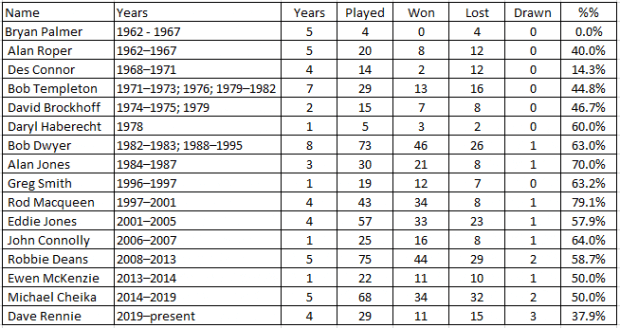Hello Cobbers.
I hope we’ve all enjoyed the long weekend just passed as brought to you for the purposes of acknowledging the birthday of the head of our favourite dysfunctional family, the British Royals. That said, resisting my urges, I’ll refrain from waxing too critical of the House of Windsor; I won’t compare them here to the Kardashians, or the House of Lannister. As a matter of fact, I’ll instead give a little plug here to the family of Saxe-Coburg-Gothas if for no other reason than to acknowledge they did get me two public holidays in two weeks. So they’re on fire.
Welcome to episode 29 of the Chewsday Chew.
This week, following the Wobblies’ dismal finish in the Rugby Championship and acknowledging the growing discontent around the comments sections of this site regarding many things but not the least of which being our friend Mr Dave Rennie, I have been reflecting on things circulating the Australian coaching role.
The first thing to comment on is the obvious: Dave is not having a good trot.
The facts are that on 20 November 2019, with the Wobblies were ranked 5th in the world, Rugby Australia announced that Dave Rennie would replace Michael Cheika as head coach of the Wallabies. Since then, Dave has led the national outfit for 29 tests. Prior to this year’s Rugby Championship, Dave’s record as national coach was 23 tests (incl the English series) with 9 wins, 3 draws and 11 losses. That’s a 39% win rate. And in that it’s worth noting that 4 of those losses were by less than 5pts so it may have been substantially better. But it wasn’t.
Update that record with this year’s Rugby Championship and the record becomes 29 tests played for 11 wins, 3 draws and 15 losses. That’s a 38% win rate (or 37.9% to be precise), or depending how you cut your cheese, that’s a 52% loss rate. At the moment that leaves us 9th in the world, with Argentina in 8th and Japan in 10th.
Giving such context in life is important. So it’s useful to compare Dave to other Wobbly coaches over the years:

The table above means that in demonstrative terms, across the last 60 years only Des Connor and Bryan Palmer had worse records then Dave Rennie. Perhaps it’s more fitting to consider Dave against coaches of the World Cup era? Acknowledging the World Cup is relevant for two reasons: we know we all play a four year now with Bill being the pinnacle of the effort and, also, World Cups with their pool games are historically good for Aussie coaches stats. Certainly in terms of coaches in the World Cup era Dave isn’t doing well with his nearest rival being the much-reviled Cheks with his comparatively lofty 50% record (although it is fair to say Dave hasn’t had his World Cup tilt yet).
So should Dave face the sack? I mean, many bayed for the blood of Cheks and even Dingo Deans – both of whom had vastly better percentages. But within that question we must ask other questions, such as if we sack him, who replaces him? But before that, we must also ask how much of those results are actually Dave’s ‘fault’? I mean we can argue for days over to what extent a coach is truly responsible for a team’s results:
- 100%? 10%?
- What about players un/available?
- Do we consider the balance of personnel versus game plan? Or even the suitability of game plan?
- How do we equalise for the extent coaches are/not responsible for base fitness and skill level?
- Do player injuries impact an impartial assessment?
- What about the quality of opponents and their strengths?
- How much does anyone actually ‘coach’ players at that level? Or is it squad management?
Those are all legitimate questions. But we all also know that regardless of how we cut it at the end of the day the coach will live and die on the team’s success.
So, in thinking about the above, I took inspiration from a prayer I was taught years ago (being a good Irish Catholic). It’s politely called the Serenity Prayer. It’s also know by my preferred name, The Drunk’s Prayer. And it goes like this:
“Lord, Grant me the courage to change that which I may, the serenity to accept that which I may not and the wisdom to know the difference.”
I’m trying here to now have the courage to focus on what a coach can actually be expected to achieve and how we (or more correctly RA) may realistically support that? That we would expect “Something good” is the obvious answer. But I confess to now be thinking about “what is good?” for an Australian coach.
Now we must ask “What does good look like” in an objective manner that can be measured? Is it just World Cup success? What is that ‘success’? Is it only winning the Bill? Or is it bigger than that one tournament? Is it international ranking? Win percentage? Is it win percentage overall or just against Tier 1 opponents? What about roster health? Roster rotation, depth and development? Is it ok to do well in a Bill but leave behind a roster so shattered and old that next guy is ‘dead man walking’? Or do we just take a moneyball approach and judge the coach on points accumulated divided by tackle completion rate to derive a performance rate and bugger all else is important? Or do we do the same but just with tries given 5 pts are better than 3 pts? When considering all that the only thing that does become apparent is that when you start breaking it down, the possible KPIs and their permutations are almost infinite.
So, after an afternoon’s heavily hung-over reflection, applying my +20 yrs of having to listen to corporate HR types bang on about rewards reflecting role, and assuming a 4 yr appointment cycle inline with the World Cup mentality, I arrived at a presumptive principle that I believe should be the ‘Role Objective Clause’ on the requisite position description for the Wobbly coach; “Achieve a minimum of Quarter Finals at the World Cup and hand over a performing, refreshed roster on exit.”
I feel this statement is the definition of success – what ‘good’ would look like – for a national coach. It absorbs ‘success’ and win/loss percentages, it absorbs tries & tackle completion, world ranking spots are a derivative of driving towards this outcome anyway, etc. etc. This statement, this objective, or ‘mission’ (if that’s your thing) positions the Chosen One to not only do well at the next Bill but to leave a functioning team behind for the next Bill. I think that’s fair and reasonable.
If that’s an acceptable dual objective, how should RA then reward/motivate said coach inline with that objective?
Firstly, I think we have to move beyond a 4 yr contract cycle going from Bill to Bill and ending with the Bill final. This approach is too susceptible to the possibility, no matter how thin, that a coach could drive towards ‘his’ one Bill and leave nothing but a vacuum of aged, broken and undeveloped players behind. We want the roster handed over for the next Bill cycle in a sustainable manner.
I’d propose something like this: the 4 year contract is to run from 1 January year 2 of World Cup cycle to 31 December Year 1 post World Cup. Thus the incumbent coach is responsible for Year 1 of the next Bill cycle. They don’t just get to walk out on the full-time whistle of the Bill final. Rather, by having them in place for +1 year means they are directly involved in the health of the squad after the inevitable retirements and ‘going north’ departures of the last Bill cycle.
Secondly, I’m a big believer in base salary plus major incentives to keep folk paid and fed, but acknowledging the importance of major events. However those bonuses cannot be founded on ‘motherhood statements’, but rather they must be objective and definable so they are clear and transparent.
I’d therefore suggest this remuneration idea based on whatever the total package worth the incoming coach negotiates: 70% of total package worth is straight monthly salary. The chap has to eat and pay rent after all. However, the ‘carrot & stick’ supporting that base is 15% of the package is payable on achieving World Cup quarter-finals and a further 15% is tied to win percentage in the coach’s last year (that being year 1 of the new Bill cycle). On top of that I’d put in a stretch bonus programme, above the agreed package worth, for Bill semi-finals and finals to reward such success accordingly, but to recognise such achievements are ‘over and above’ the contracted Role Objective measurements.
If we take that approach, we know the off-centre 4yr life-cycle would drive a coach to think mostly on the Bill but also beyond it. So thus player roster development and depth is part and parcel of their planning. Secondly, having the bonus approach tied to major, objective events is self-explanatory in its motivating impact (I feel). And overall, that approach taken together gels neatly with the ‘Role Objective Clause’ on the requisite position description for the Wobbly coach: “Achieve quarter finals or better at the World Cup and hand over a performing, refreshed roster on exit.”
So there’s my idea. Instead of endlessly complaining about things, there’s one part of a plan to have the courage to change what I may. My proposition to you my good reader is to ask two questions:
- Are the dual objectives of quarter finals at the Bill and a refreshed roster fair, objective and reasonable? Is that what we want?
- Is my timing and bonus proposal fair, objective and reasonable? Will that get us what we want?
Alternatively, what else or different should we do?
I look forward to the chat…


